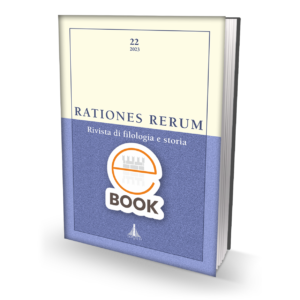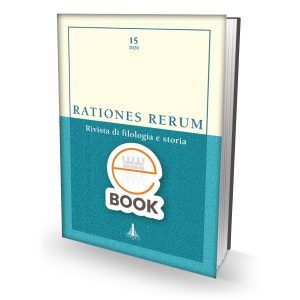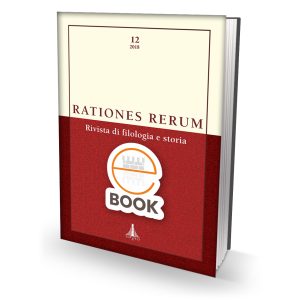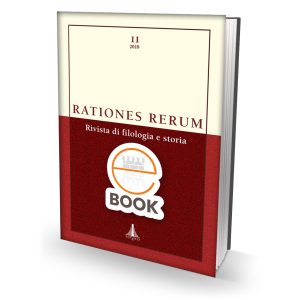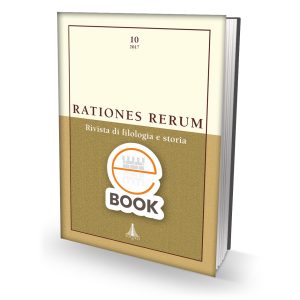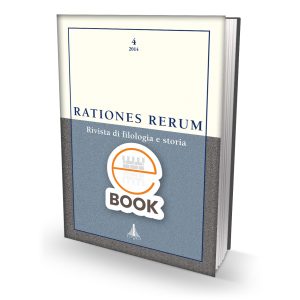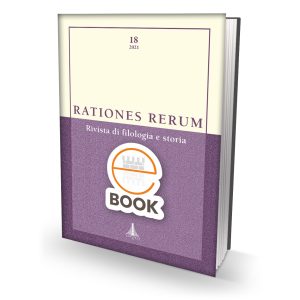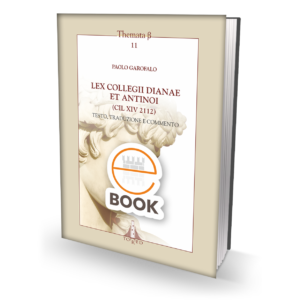RATIONES RERUM 24 – Rivista di filologia e storia (E-book)
35,00 €
Autori vari
Anno edizione: 2024
Formato 17×24 – Pagine 248
ISBN 9791281673144 – ISSN 2284-2497
Prezzo: € 35,00
- Descrizione
- ANTEPRIMA
- ABSTRACTS
Descrizione
SOMMARIO
Federicomaria Muccioli, Teopompo, Teocrito di Chio e il culto per Alessandro Magno, p. 9
Maria Barbara Savo, Poikilia. Frammenti di una trasformazione irreversibile, p. 21
Federico Favi, Alcuni casi di (presunto) lessico poetico in Senofonte, p. 41
Francesca Panetta, Metafore e lessico dell’esilio nelle consolationes e nelle tragedie di Seneca, p. 73
Étienne Wolff, Un oracle trompeur chez Claudien (De bello Getico 544-557): l’annonce à Alaric de sa victoire sur Rome, p. 97
Stefania Filosini, La Samaritana al pozzo nella riscrittura di Sedulio (Charm. Pasch. 4, 222-232 e Op. Pasch. 4, 18), p. 107
Fabio Gasti, Isidoro e i lettori difficili: indicazioni di metodo per una compilazione efficace, p. 133
Emore Paoli, Autori latini classici nel Legendarium di Pietro Calò. Un primo sondaggio, p. 151
Cristiano Luciani, Kavafis e la cultura latina: indagine preliminare, p. 169
Alessandro Campus, Maria Giulia Amadasi Guzzo. Un ricordo, p. 199
Recensioni
Daniele Asproni, rec. di Guido Milanese, Le ragioni del latino, Brescia, Scholé, 2024, p. 209
Antonella Amico, rec. di Leandro Polverini, Scritti scelti di storiografia italiana e tedesca sul mondo antico tra XIX e XX secolo, Roma – Bristol, «L’Erma » di Bretschneider, 2024, p. 214
Leopoldo Gamberale, rec. di Sebastiano Timpanaro – Scevola Mariotti, Carteggio (1944-1999), Pisa, Edizioni della Normale, 2023, p. 222
Libri ricevuti, p. 231
Abstracts, p. 235
Indice analitico (a cura di Carlo Di Giovine), p. 239
Istruzioni per gli autori, p. 243
Federicomaria Muccioli
Teopompo, Teocrito di Chio e il culto per Alessandro Magno
pp. 9-20
This article – left unfinished by its author, who passed away in 2020 – studies the position of two prominent figures from the island of Chios, the historian Theopompus and the rhetor Theocritus, with respect to the cult of Alexander the Great. While Theopompus saw no contraindication to the deification of the Macedonian king, Theocritus opposed resolutely such forms of adulation, extending his criticism to the exhibitions of wealth and luxury with which Alexander and his companions cloaked their power.
Maria Barbara Savo
Poikilia. Frammenti di una trasformazione irreversibile
pp. 21-40
The age of Lycurgus is rightly considered a key moment in the transformation process of Athenian history, and the Atthidographer Phanodemus seems to have contributed significantly to the creation of a “new” Athens. The earliest attestation of this historian, dated 343/2 BC, is offered by an epigraphic document (IG II3 306) in which some formulas, while tracing the courtly language of the fifth century, are radically resemanticized in a democratic key. Among the formularies of this inscription, there is one relating to the propitiatory dedications, ἐφ’ ὑγιείαι καὶ σωτηρίαι τοῦ δήμου τοῦ Ἀθηναίων καὶ παίδων γυναικῶν τῶν ἐν τῆι χώραι πάντων, which is a significant reprise of an expression already used by Aristophanes and could refer to the so-called Decree of Themistocles, which in those years was repeatedly cited in Athenian courtrooms.
Federico Favi
Alcuni casi di (presunto) lessico poetico in Senofonte
pp. 41-72
The study of Xenophon’s language has attracted renewed interest in recent years, but much remains to be done. This article examines a category of lexemes used by Xenophon, namely what critics have commonly referred to as “poeticisms”. Without questioning the existence of poetic formulas in Xenophon, this article examines a selection of forms for which a classification under the category of “poeticism” is unsatisfactory for several reasons. First, it is necessary to reject the binary opposition between poetic language and a common, unmarked, middle-register language that would be typical of prose writing. Moreover, not all forms of marked language adopted by Xenophon pursue the goal of raising the register, since their use may be an attempt to achieve rhetorical effects. Finally, we must consider the possibility that forms that appear poetic, according to their distribution in literature, were perceived differently, as in the case of terms belonging to specialized languages or terms that are euphemistic in various ways.
Francesca Panetta
Metafore e lessico dell’esilio nelle consolationes e nelle tragedie di Seneca
pp. 73-95
This article examines Seneca’s depiction of exile following the edict of banishment to Corsica issued by the Emperor Claudius in 41 AD. The analysis focuses on the metaphorical and lexical dimensions of this experience, particularly through the imagery of to fall, shipwreck, and medicine. Such metaphors are explored in relation to both Seneca’s consolations and tragedies, revealing a semantic continuity between these works and highlighting the complexity of exile.
Étienne Wolff
Un oracle trompeur chez Claudien (De bello Getico 544-557): l’annonce à Alaric de sa victoire sur Rome
pp. 97-105
Despite Plutarch’s view, oracles did not disappear in Late Antiquity, and some of them are still in the tradition of deceptive oracles. Such is the case, in Claudian’s De bello Getico (a historical epic celebrating the victory of the Romans at Pollentia over Alaric’s Goths in 402 CE), of the oracle announcing to King Alaric that he will invade Italy usque ad Urbem. This oracle is misleading in that Urbs does not refer to the city of Rome, as Alaric believes, but to a river of the same name (now called Orba), near which he would be defeated by the Roman general Stilicho. This article analyzes this oracular response by asking whether it is an invention of Claudian and examines the way it is presented and the meaning it might have.
Stefania Filosini
La samaritana al pozzo nella riscrittura di Sedulio (Carm. Pasch. 4, 222-232 e Op. Pasch. 4, 18)
pp. 107-132
After analyzing the treatment of Christ’s encounter with the woman of Samaria (John 4, 1-19) by Sedulius, Carm. Pasch. 4, 222-232 and Op. Pasch. 4, 18, this article examines possible connections with two other non-miraculous events (the sinful woman of Luke 7, 36-50 and the adulteress of John 8, 1-11) and tries to understand the catechetical implications of the episode in relation to the structure of this part of Sedulius’ work.
Fabio Gasti
Isidoro e i lettori difficili: indicazioni di metodo per una compilazione efficace
pp. 133-150
This article examines some texts in which Isidore of Seville expresses his programmatic ideas about encyclopedic writing, namely that it should be characterized by a substantial need for clarity and brevity, and suitable for satisfying the expectations of a public that loved exhaustive but synthetic writing. The analysis considers some commonplaces of encyclopedic treatises and exegetic tradition and shows their importance for Isidore’s literary memory.
Emore Paoli
Autori latini classici nel Legendarium di Pietro Calò. Un primo sondaggio
pp. 151-168
An initial survey of the Latin authors quoted in the Legendarium composed between 1330 and 1342 by the Dominican friar Pietro Calò reveals that the compiler, although he had a conspicuous classical library at his disposal, made use almost exclusively of repertories, encyclopedias, philosophical summa, and moral specula. Nevertheless, his intellectual attitude towards classicism, assessed in relation to hagiography, constitutes an interesting but unfortunate novelty.
Cristiano Luciani
Kavafis e la cultura latina: indagine preliminare
pp. 169-198
If the exploration of the “Greek” side of Cavafy’ poetic inspiration can be immediately taken for granted, less taken for granted – not to say strongly limited, always in the sphere of ἀρχαιογνωσία (knowledge of ancient culture) – seems to have been the attention paid to the role of Latin culture. This topic, on the contrary, becomes a full part of the Alexandrian poet’s background and demonstrates functions that are anything but secondary, albeit through the mediation of translations from French or English. In this “preliminary investigation” the article tries to highlight, as far as possible, every form of reference by the poet of Alexandria to Latin authors and historical figures, down to simple and occasional aphoristic allusions.
Alessandro Campus
Maria Giulia Amadasi Guzzo. Un ricordo
pp. 199-207
This article remembers Maria Giulia Amadasi Guzzo († August 30, 2024) with reference to her last two published volumes, Alfa Beta. Formazione e affermazione di un mezzo di comunicazione di successo, Bologna 2024, and La lingua dei Fenici, Milan 2024 (with R. De Simone). She taught Semitic Epigraphy at the Sapienza University of Rome and published important corpora of Phoenician-Punic inscriptions, collecting, among others, the inscriptions from the colonies of the West, Tripolitania, and the island of Mozia.





